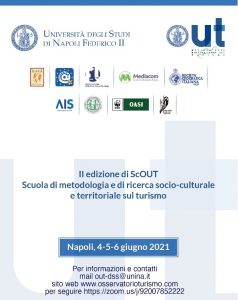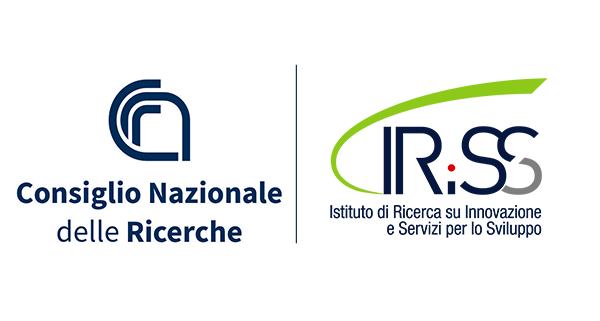The second edition of “ScOUT” proposed 3 days – 4-6 June 2021 – of training and socio-territorial research on the relationship between tourism and biodiversity.
 The Observatory on Tourism of the University of Naples Federico II – OUT – organized the second edition of “ScOUT”, School of Sociology of Tourism, with the theme “Eco-tourism and socio-territorial research methods on tourism”. The event proposed 3 days (4-6 June 2021) of training and socio-territorial research on the relationship between tourism and biodiversity, opened with the International Conference “Ecotourism: travellers, local communities, territories, experiences in the space of new society”.
The Observatory on Tourism of the University of Naples Federico II – OUT – organized the second edition of “ScOUT”, School of Sociology of Tourism, with the theme “Eco-tourism and socio-territorial research methods on tourism”. The event proposed 3 days (4-6 June 2021) of training and socio-territorial research on the relationship between tourism and biodiversity, opened with the International Conference “Ecotourism: travellers, local communities, territories, experiences in the space of new society”.
The focus of the event is the importance of protecting natural environments for the preservation of biodiversity. Primary importance for nature conservation is the relationship of biodiversity with tourism. In the last decade, travel destinations have become more diversified and visitors increasingly demand ecotourism through trips to enjoy activities in direct contact with natural, wild and unhumanised environments.
Research methods, exchange, integration, diversity, eco-sustainable development, the cultural and economic progress of human societies, respect for fundamental natural rights, freedom and dignity of every human being, while protecting and making reasonable use of natural resources: this is the perspective from which the relationship between biodiversity and tourism can be interpreted. This theme is even more relevant in view of the recovery of tourism after the COVID-19 pandemic: because the restart, as stressed by many, must be an opportunity to rethink tourism with a different focus on long-term sustainability, full respect for the environment, the authenticity of places and the rediscovery of traditions.
The first of three days, the coordinator of the European project Be.CULTOUR, researcher Antonia Gravagnuolo from the CNR-IRISS research institute, contributed by referring the themes of the project, highlighting the importance to move beyond tourism through a longer-term human-centred development perspective, enhancing cultural heritage and landscape values, promoting an understanding of cultural tourism towards one that puts humans and circular economy models at its centre, paying attention to nature, communities and cultural diversity. In particular, Gravagnuolo explained how the circular economy model based on a human-centred approach can stimulate sustainable growth in terms of tourism, also in order to cope with the effects of the Covid-19 pandemic on the territories. This is possible through the passage from a dissipative tourism to a regenerative one which, among other things, reuses in adaptive terms the natural and cultural capital. The project aims to stimulate communities to cooperate towards a common goal by identifying appropriate strategies that take into account also local specificities.
The event was held in online mode for the International Conference and social research methodology workshop, while the final event on 6th June 2021 provided a scientific visit to the WWF Oasis “Cratere degli Astroni” Italian Nature Reserve, with the aim of providing the elements for understanding the planning, development and management of an ecotourism activity. The initiative aimed to show how ecotourism activities can be carried out in urban and peri-urban environments, bringing users closer to urban biodiversity.
More info


 The Observatory on Tourism of the University of Naples Federico II – OUT – organized the second edition of “ScOUT”, School of Sociology of Tourism, with the theme “Eco-tourism and socio-territorial research methods on tourism”. The event proposed 3 days (4-6 June 2021) of training and socio-territorial research on the relationship between tourism and biodiversity, opened with the International Conference “
The Observatory on Tourism of the University of Naples Federico II – OUT – organized the second edition of “ScOUT”, School of Sociology of Tourism, with the theme “Eco-tourism and socio-territorial research methods on tourism”. The event proposed 3 days (4-6 June 2021) of training and socio-territorial research on the relationship between tourism and biodiversity, opened with the International Conference “
You must be logged in to post a comment.